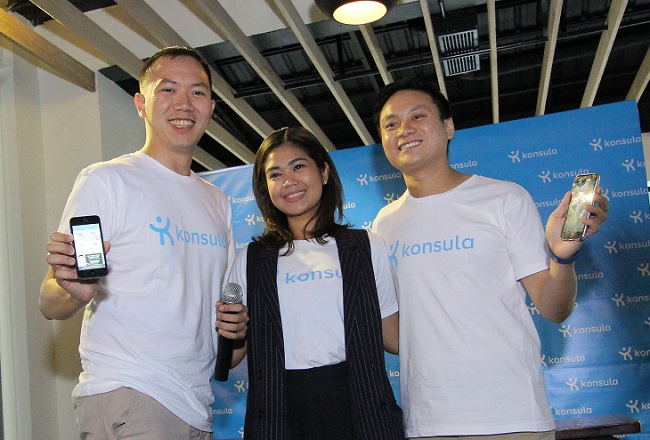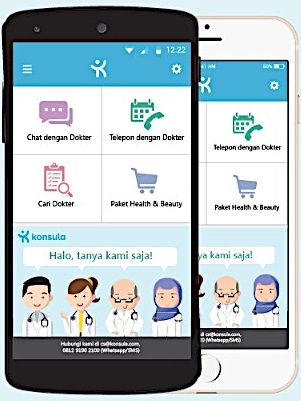Healthcare startup Konsula levels up, from e-directory to e-commerce
By Masyitha Baziad June 29, 2016
- Now a marketplace selling services, soon to include products, equipment
- Inviting more brick-and-mortar healthcare companies to come on board

BARELY a year after its launch as an online directory of medical and healthcare services, Jakarta-based startup PT Konsula Amarta Nusantara (Konsula) has now entered the e-commerce battlefield with the launch of Konsula e-Store.
The online marketplace currently has on board 300 merchants offering services that include skin and beauty treatments, dental and pregnancy care, and medical checkups.
With this, Konsula is now describing itself as a health marketplace whose core service is connecting users to healthcare providers.
“We can finally call ourselves a health marketplace, the only one in Indonesia, and hopefully the biggest,” Konsula cofounder and chief executive officer Shinta Nurfauzia told Digital News Asia (DNA) on the sidelines of its press launch in Jakarta on June 27.
Shinta said that Konsula e-Store acts as a gateway for healthcare service providers to go online, and also as a tool for them to expand their customer base.
Even though similar directory and telemedicine services like TanyaDok and DokterGratis are already available in Indonesia, none have an attached e-commerce platform.
“Opening a marketplace was our goal from the beginning,” said Shinta, however adding that developing the technology and system required more time, which is why it launched with the directory first.
According to Shinta, it took Konsula six months to develop the technology from scratch.
Established in October last year with undisclosed amount of seed funding from East Ventures, the startup currently has 2,800 clinics and 900 doctors listed in its directory, as well 20 dedicated doctors on its telemedicine platform.
It also recently received an unannounced extended seed round of funding from East Ventures and another investor – both the amount and the identity of the latter have not been disclosed.
“We want to break open the access to healthcare by leveraging technology – first in Indonesia, and eventually regionally,” said Shinta.
How it works

Both the Konsula portal website and its app, available for the Android and iOS platforms, allow users to access the directory, telemedicine service, and the e-commerce store.
In the e-store section, users can look for deals or services offered by clinics, hospitals, and Konsula’s merchants.
At a glance, it looks like a health-focused daily deals marketplace such as Groupon. However, Shinta said that Konsula’s e-store is not limited to deals only.
“Deals can be found only when there is a special event – like now with the official launch of our e-store, and that is why you can see almost every merchant offering deals and discounts,” she said.
Once users decide on a specific healthcare service, they can pay through the Konsula platform and will then receive an electronic voucher. They can bring this e-voucher to the actual clinic or hospital for their treatment.
Meanwhile, Konsula merchants can access the e-store dashboard to see how well their online sales are going, which would help them craft better services and products for their customers, according to Shinta.
Currently the e-store only offers healthcare services like dental treatments, medical checkup packages, and laser treatments for skin. Konsula will add more verticals, including healthy lifestyle products and even gym and fitness studio memberships, in September.
“Our goal is to get all the clinics and hospitals in our directory into the e-store,” said Shinta, however declining to put a timeframe on this.
Low awareness of healthcare e-commerce
Among the 300 merchants currently on Konsula e-Store is PT Kimia Farma Diagnostika (KFD), the clinical laboratory arm of pharmaceutical company PT Kimia Farma (Persero) Tbk, which is also a state-owned enterprise.
KFD has 44 labs across Indonesia, most of them on the island of Java.
“We realised we could not afford to create our own e-commerce platform just yet; it would have taken a lot of effort and money,” said KFD president director Adil Fadilah Bulqini.
“However, with healthcare-focused startups helping the industry to go online, we are definitely on board,” he told DNA on the sidelines of the Konsula event.
KFD is selling medical checkup services and laboratory test packages on the Konsula platform, although the company will also explore other marketplace partnerships and will not be exclusive to Konsula, according to Adil.
“So far, we have three partnerships with local marketplaces, and will continue to seek more partnership to sell our services online,” he said.
“Healthcare services and products are just entering the e-commerce realm and we are not as popular as fashion yet – however, we believe that with good promotions and proper education, more people will eventually be attracted to us,” he added.
Doctors benefit too
 Konsula has previously said that it intends to digitise the healthcare sector in Indonesia. With its new thrust, not only can companies benefit and leverage on its platform to go online, but individual doctors too.
Konsula has previously said that it intends to digitise the healthcare sector in Indonesia. With its new thrust, not only can companies benefit and leverage on its platform to go online, but individual doctors too.
Dr Murni Fianti, a general practitioner and one of the 20 dedicated telemedicine doctors on Konsula, believes that the online platform has enabled individual doctors to reach more patients.
She said she feels more fulfilled knowing that she has helped patients who chat with her from areas as far away as Sumatra and Sulawesi.
“I can do even more – I can be standby from morning to night, except for my own clinic hours, to engage with patients through Konsula,” she told DNA on the sidelines of the Konsula event.
“I can be anywhere, anytime, but can still do things that I love, thanks to technology – this is what every medical doctor should do,” she added.
Dr Murni said that the telemedicine platform on Konsula is available from 8am to 11pm from Monday to Friday, but will soon expand to weekends and also become a 24-hour service.
The telemedicine service is free for now. Konsula’s Shinta said that her startup is currently subsidising the 20 doctors on its platform, thanks to the investor funds, but is exploring ways to monetise this.
“We are undertaking a survey of both doctors and users to find the middle ground on how much to charge,” she said.
Telemedicine challenge
Opening up access to doctors to consult with patients remotely via telemedicine has a regulatory aspect too, which is why Konsula decided to approach the Indonesian Doctors Association to advise it.
“We welcome all startups which want to help digitise Indonesia’s healthcare service, and we appreciate the fact that Konsula came to us about its platform, and to ask for our support,” the association’s vice general manager of cooperatives Dr Fery Rahman told DNA.
Remote health consultation has its own set of rules – for example, the doctor can only give preventive, educational, and first aid advice.
Dr Fery said that his association and Indonesia’s Ministry of Health is currently putting together an official handbook of telemedicine practices in Indonesia, expected to be completed by the end of the year.
“While technologies like telemedicine will have a huge impact on healthcare services in Indonesia, they cannot function as complete consultations and give out prescriptions,” he said.
“You can consult and educate people, and help them to get to the right doctor, or even simply suggest over-the-counter drugs for mild illnesses,” he added.
But even this is helpful, according to Dr Murni, who argued that the main problem of healthcare in Indonesia is that it can take up to one whole day for a patient to go to the hospital, queue up and wait to see a general practitioner, even to just get a referral.
“Telemedicine helps to cut the process – patients can now consult with us through the [Konsula] app and telemedicine platform, and we will help refer them to the right doctors,” she said.
“It is efficient and straightforward,” she added.
In fact, Konsula wants to ‘digitise’ all 160,000 doctors in Indonesia – a small number for a country with a population of 250 million.
“We might not be able to help when it comes to creating more doctors, but we can maximise the current number of doctors to at least help patients all over the country with first-touch treatment and consultation,” said Shinta.
Related Stories:
Konsula wants to lead Indonesia’s healthcare digitisation
Practo to roll out to more SEA cities
MyDoc wants to help you choose the right healthcare provider
Bringing the medical industry into the 21st century
For more technology news and the latest updates, follow us on Twitter, LinkedIn or Like us on Facebook.


